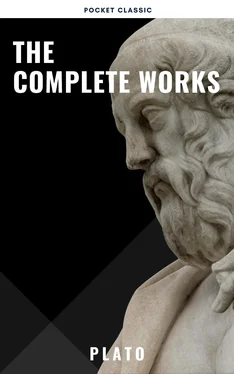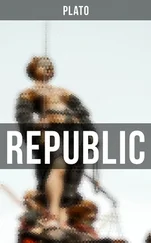I replied: I will begin again at the same point, Protagoras, and tell you once more the purport of my visit: this is my friend Hippocrates, who is desirous of making your acquaintance; he would like to know what will happen to him if he associates with you. I have no more to say.
Protagoras answered: Young man, if you associate with me, on the very first day you will return home a better man than you came, and better on the second day than on the first, and better every day than you were on the day before.
When I heard this, I said: Protagoras, I do not at all wonder at hearing you say this; even at your age, and with all your wisdom, if any one were to teach you what you did not know before, you would become better no doubt: but please to answer in a different way—I will explain how by an example. Let me suppose that Hippocrates, instead of desiring your acquaintance, wished to become acquainted with the young man Zeuxippus of Heraclea, who has lately been in Athens, and he had come to him as he has come to you, and had heard him say, as he has heard you say, that every day he would grow and become better if he associated with him: and then suppose that he were to ask him, ‘In what shall I become better, and in what shall I grow?’—Zeuxippus would answer, ‘In painting.’ And suppose that he went to Orthagoras the Theban, and heard him say the same thing, and asked him, ‘In what shall I become better day by day?’ he would reply, ‘In flute-playing.’ Now I want you to make the same sort of answer to this young man and to me, who am asking questions on his account. When you say that on the first day on which he associates with you he will return home a better man, and on every day will grow in like manner,—in what, Protagoras, will he be better? and about what?
When Protagoras heard me say this, he replied: You ask questions fairly, and I like to answer a question which is fairly put. If Hippocrates comes to me he will not experience the sort of drudgery with which other Sophists are in the habit of insulting their pupils; who, when they have just escaped from the arts, are taken and driven back into them by these teachers, and made to learn calculation, and astronomy, and geometry, and music (he gave a look at Hippias as he said this); but if he comes to me, he will learn that which he comes to learn. And this is prudence in affairs private as well as public; he will learn to order his own house in the best manner, and he will be able to speak and act for the best in the affairs of the state.
Do I understand you, I said; and is your meaning that you teach the art of politics, and that you promise to make men good citizens?
That, Socrates, is exactly the profession which I make.
Then, I said, you do indeed possess a noble art, if there is no mistake about this; for I will freely confess to you, Protagoras, that I have a doubt whether this art is capable of being taught, and yet I know not how to disbelieve your assertion. And I ought to tell you why I am of opinion that this art cannot be taught or communicated by man to man. I say that the Athenians are an understanding people, and indeed they are esteemed to be such by the other Hellenes. Now I observe that when we are met together in the assembly, and the matter in hand relates to building, the builders are summoned as advisers; when the question is one of ship-building, then the ship-wrights; and the like of other arts which they think capable of being taught and learned. And if some person offers to give them advice who is not supposed by them to have any skill in the art, even though he be good-looking, and rich, and noble, they will not listen to him, but laugh and hoot at him, until either he is clamoured down and retires of himself; or if he persist, he is dragged away or put out by the constables at the command of the prytanes. This is their way of behaving about professors of the arts. But when the question is an affair of state, then everybody is free to have a say—carpenter, tinker, cobbler, sailor, passenger; rich and poor, high and low—any one who likes gets up, and no one reproaches him, as in the former case, with not having learned, and having no teacher, and yet giving advice; evidently because they are under the impression that this sort of knowledge cannot be taught. And not only is this true of the state, but of individuals; the best and wisest of our citizens are unable to impart their political wisdom to others: as for example, Pericles, the father of these young men, who gave them excellent instruction in all that could be learned from masters, in his own department of politics neither taught them, nor gave them teachers; but they were allowed to wander at their own free will in a sort of hope that they would light upon virtue of their own accord. Or take another example: there was Cleinias the younger brother of our friend Alcibiades, of whom this very same Pericles was the guardian; and he being in fact under the apprehension that Cleinias would be corrupted by Alcibiades, took him away, and placed him in the house of Ariphron to be educated; but before six months had elapsed, Ariphron sent him back, not knowing what to do with him. And I could mention numberless other instances of persons who were good themselves, and never yet made any one else good, whether friend or stranger. Now I, Protagoras, having these examples before me, am inclined to think that virtue cannot be taught. But then again, when I listen to your words, I waver; and am disposed to think that there must be something in what you say, because I know that you have great experience, and learning, and invention. And I wish that you would, if possible, show me a little more clearly that virtue can be taught. Will you be so good?
That I will, Socrates, and gladly. But what would you like? Shall I, as an elder, speak to you as younger men in an apologue or myth, or shall I argue out the question?
To this several of the company answered that he should choose for himself.
Well, then, he said, I think that the myth will be more interesting.
Once upon a time there were gods only, and no mortal creatures. But when the time came that these also should be created, the gods fashioned them out of earth and fire and various mixtures of both elements in the interior of the earth; and when they were about to bring them into the light of day, they ordered Prometheus and Epimetheus to equip them, and to distribute to them severally their proper qualities. Epimetheus said to Prometheus: ‘Let me distribute, and do you inspect.’ This was agreed, and Epimetheus made the distribution. There were some to whom he gave strength without swiftness, while he equipped the weaker with swiftness; some he armed, and others he left unarmed; and devised for the latter some other means of preservation, making some large, and having their size as a protection, and others small, whose nature was to fly in the air or burrow in the ground; this was to be their way of escape. Thus did he compensate them with the view of preventing any race from becoming extinct. And when he had provided against their destruction by one another, he contrived also a means of protecting them against the seasons of heaven; clothing them with close hair and thick skins sufficient to defend them against the winter cold and able to resist the summer heat, so that they might have a natural bed of their own when they wanted to rest; also he furnished them with hoofs and hair and hard and callous skins under their feet. Then he gave them varieties of food,—herb of the soil to some, to others fruits of trees, and to others roots, and to some again he gave other animals as food. And some he made to have few young ones, while those who were their prey were very prolific; and in this manner the race was preserved. Thus did Epimetheus, who, not being very wise, forgot that he had distributed among the brute animals all the qualities which he had to give,—and when he came to man, who was still unprovided, he was terribly perplexed. Now while he was in this perplexity, Prometheus came to inspect the distribution, and he found that the other animals were suitably furnished, but that man alone was naked and shoeless, and had neither bed nor arms of defence. The appointed hour was approaching when man in his turn was to go forth into the light of day; and Prometheus, not knowing how he could devise his salvation, stole the mechanical arts of Hephaestus and Athene, and fire with them (they could neither have been acquired nor used without fire), and gave them to man. Thus man had the wisdom necessary to the support of life, but political wisdom he had not; for that was in the keeping of Zeus, and the power of Prometheus did not extend to entering into the citadel of heaven, where Zeus dwelt, who moreover had terrible sentinels; but he did enter by stealth into the common workshop of Athene and Hephaestus, in which they used to practise their favourite arts, and carried off Hephaestus’ art of working by fire, and also the art of Athene, and gave them to man. And in this way man was supplied with the means of life. But Prometheus is said to have been afterwards prosecuted for theft, owing to the blunder of Epimetheus.
Читать дальше












